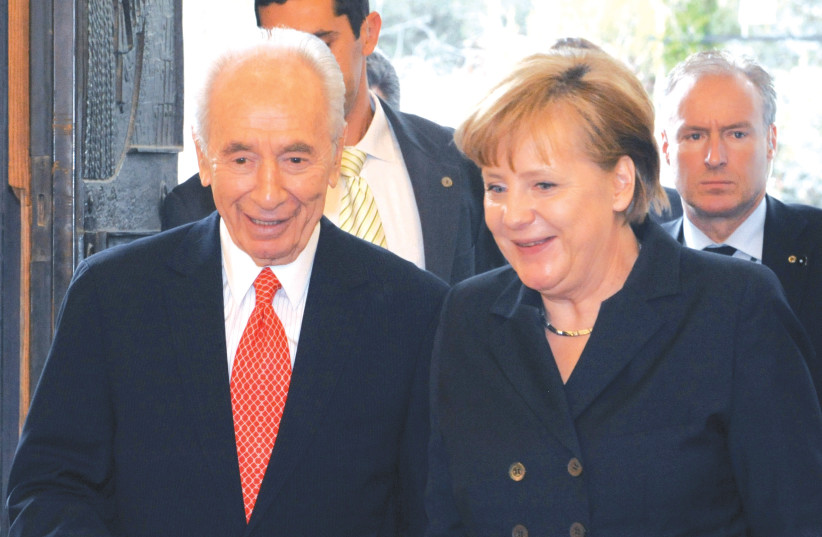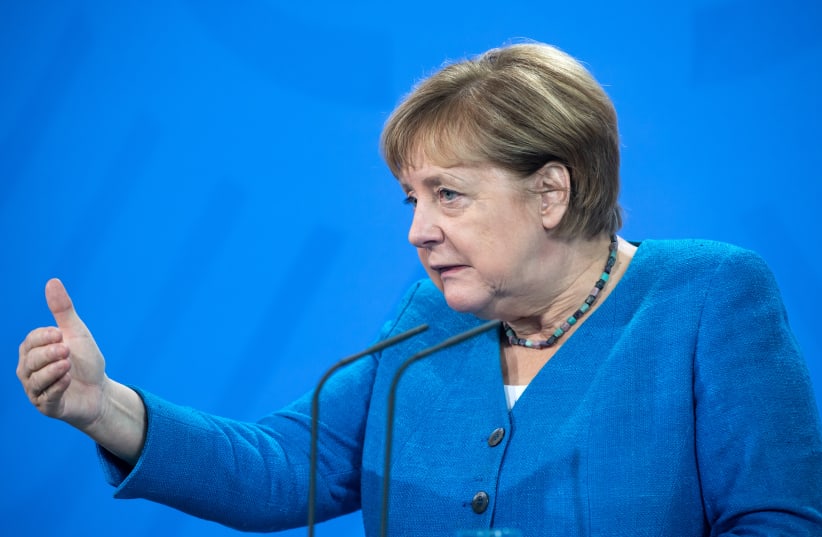German Chancellor Angela Merkel arrived in Jerusalem on Sunday for a visit she did not need to make.
Merkel, who formally stepped down from her post in August after serving 16 years, could have decided to stay in Germany and ride out the remaining days of her government and until a new coalition is formed, most likely by the Social Democratic Party (SDP) and its leader, Vice-Chancellor Olaf Scholz.
But instead, Merkel has come to Israel and will meet with Prime Minister Naftali Bennett, President Isaac Herzog, Foreign Minister Yair Lapid, and participate in a cabinet meeting in Jerusalem.
Merkel and Bennett will visit Yad Vashem and the outgoing chancellor will also be awarded an honorary doctorate from Technion-Israel Institute of Technology and join a roundtable at the Institute for National Security Studies in Tel Aviv.
Merkel is doing all of this because she is a true friend of Israel and the Jewish people and for that we thank her. There is no pressing diplomatic issue that requires she presence in Israel and there is currently no major international crisis that she - a lame duck chancellor - needs to manage right now.


She has come to Israel on her eighth visit as chancellor to convey a message to Germany, Israel and Europe just how committed her country is to the security and viability of the Jewish state, its future and its success.
Under her tenure, Germany took strides toward Israel that were previously unseen. One clear example was in the subsidy provided for Israel’s procurement of the advanced German-built Dolphin-class submarines, an issue that later, unfortunately, became mired in controversy amid corruption charges brought against top Israeli officials involved in the deal. She helped Israel within the corridors of the European Union, with Germany frequently referred to as Israel’s closest friend on the continent.
Famously, Merkel was the first German chancellor to address the Knesset in 2008, and she declared that Germany’s responsibility for Israel’s security was part of its raison d’être. A decade later, in another visit to Jerusalem, she said that Germany was committed to “everlasting responsibility” to Israel “due to the crimes of the Holocaust.”
But as Herb Keinon pointed out in these pages last week, her presumptive successor does not necessarily share that same emotional attachment to Israel. “What that means for Israel is that as German parliamentarians get younger, their commitment to Israel’s security as a result of Germany’s responsibility for the Holocaust is likely to be considerably less than it has been for Merkel and her generation, for whom the Holocaust and the Third Reich are fresher memories,” Keinon wrote.
According to a New York Times report, while only one in seven of the outgoing members of the German parliament is under 40, one in three of the 735 members voted into parliament in September was born after 1981. And that represents a significant generational shift.
The question is what can Israel do about it. This is a similar predicament to what Israel faces in the United States where, there too, it is being met with greater distance within the Democratic Party.
The cornerstone of Israel’s relationship with Germany has, of course, been the Holocaust and the sense of responsibility and guilt that many Germans have felt over the years for what their countrymen did in the 1930s and 1940s. But as time passes, generations change as do sentiments. The connection that the Holocaust played in bringing Germans and Israelis together is no longer as powerful.
That is why while it is important to use Merkel’s visit to thank her for her support for Israel over the years and Jerusalem also needs to start thinking of new ways to build and foster relations between younger Israelis and Germans.
The Holocaust will always play a role in our tragic history but that will not always be enough to get foreign countries to retain support for Israel. Israel has a lot to offer the world in technology, humanitarian assistance, culture, arts, science, medicine and military power. We will need to use all that and more to build and foster relations.
Now is a good time to start with Germany.
